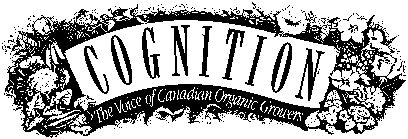

Cognition Index | Virtual Library
| Magazine Rack
Search
| Join the Ecological Solutions Roundtable
Virtually everyone who grows for sale has experienced the problem of not being able to sell what they’ve taken months to grow. Last winter, growers on southern Vancouver Island and the Gulf Islands were surveyed about how they marketed their produce. I managed the project with the support of Island Natural Growers (ING), South Island Organic Producers Association (SIOPA) and Island Organic Producers Association (IOPA). Everyone on the mailing lists of those groups was sent two questionnaires, one to fill out and one to pass on to another grower. Surveys were handed out at meetings, seed exchanges and other events. Just over 50 were returned – 27 responses have come from the Gulf Islands, 15 from the Victoria area, four from Duncan and five from more northern parts – and they continue to trickle in.;
First of all, we’re a small group, and while we could name one or two growers in every community who did not respond, on the whole most of the organic community who grows for sale is represented in the returns. With rare exception, larger growers are certified or are planning to certify. All but one of the certified growers were certified with IOPA. Farming provides, on average, 30% of growers’ incomes. Six growers support themselves totally from their farms; others sell enough to maintain farm tax status and/or provide some percentage of household income.
All growers who responded use more than one method to sell their goods, but farmers’ markets are by far the most commonly used way to sell produce. Four use CSAs, many sell to restaurants and health food stores, and a few have farm gate stands. Smaller growers tend to use farm gate stands more often than larger growers. A few sell through mail-order catalogues, and some have at least experimented with selling wholesale.
Most growers feel that they have moderate room to expand their production, certified growers more so. Sensing that the market and price potential are there encourages growers to consider expansion. Lack of time, money, free labor, land and equipment hold growers back from expanding.
This project was first initiated over two years ago in response to some clear marketing problems that growers were experiencing. There have been some noticeable changes since then, including the establishment of an organic mid-week market on Salt Spring, the opening of a major organic outlet in Victoria, a marked increase in applications for certification and an increased use of price lists by local marketers.
Organic growers need more ways to deal with glut and with dumping at markets. Many growers emphasized the need for consumer education so that customers would value the flavor, nutrition and freshness of local organic food and be willing to pay for it. While growers recognize the need to cooperate, they also acknowledge that we’re a pretty independent bunch.
Growers face a baffling array of organizations. Each area has a local growing group: ING, SIOPA, and the Duncan Smallholders. IOPA is the regional certifying body. Certified Organic Associations of B.C. (COABC) is the provincial certifying body. COG is the national advocacy and educational organization. ING and SIOPA are chapters of COG. Many respondents were unclear about what the groups offered or what their fees were. Local growing groups were appreciated for the comradeship and exchange of growing information. COG was valued for providing a national presence, for its education through COGNITION and for its library. IOPA provides certification, and a purposeful commitment to organics. No respondents were certified through COABC.
This survey provided a snapshot of the organic community in our region. Some of the most profound information elicited by the survey was of the "it’s so simple, why haven’t we figured this out before?" nature. We should take ourselves more seriously. The organic growing community in our region is only slightly more than fifty farms. While we may feel isolated, each on our own small farm, we are part of a small but vibrant growing community. People want our food, and they’ll pay for it. We just have to improve the channels for selling it.
Our local organizations are the most important ways that growers exchange information, organize local events, build community support, and build the small infrastructures (like organic markets) that make local marketing work.
IOPA effectively represents the commercial organic grower (and there are probably no more than 30 of us) in our region and could take a much stronger role in consumer education and lobbying. We need to educate potential customers about why it’s important to buy certified organic food. This does not necessarily split the organic community because most growers certify as soon as they become large enough.
This project surveyed growers. If it was possible to reach the ephemeral consumers, I’d bet that their main concern is how to find us.
Over the winter, the results of this survey will be discussed at meetings of the three supporting groups. We hope that through discussion, each will analyze the results in terms of potential impact on that organization. Anyone who wants more information about the survey should contact me at (250) 537-4987.
Susan Grace is a market gardener at Mother Earth Gardens on Salt Spring Island.
Copyright © 1997. Susan Grace.
Reprinted with permission. All rights reserved.
Info Request | Services | Become EAP Member | Site Map
Give us your comments about the EAP site
Ecological Agriculture Projects, McGill University (Macdonald
Campus)
Ste-Anne-de-Bellevue, QC, H9X 3V9 Canada
Telephone:
(514)-398-7771
Fax:
(514)-398-7621
Email: info@eap.mcgill.ca
To report problems or otherwise comment on the structure of this site, send mail to the Webmaster